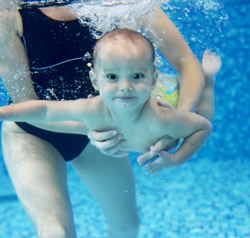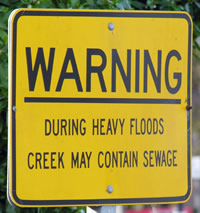
With summer quickly approaching, interstitial cystitis patients are asking “Is it safe to swim?” The answer is complex. Swimming is an ideal exercise for patients struggling with chronic bladder or pelvic pain. It’s gentle, non weight-bearing and minimizes trauma to the pelvic floor. Sounds great, right? The challenge, unfortunately, are the chemicals (specifically the chlorine and acid) used to make pool water bacterial free.
A Swimming Pool Accident Triggered My Bladder Pain
 My bladder pain first began after a terrible swimming pool mishap. I had been distance swimming at a private club for years with no problems. One day I noticed some flakes in the water that were settling on the bottom of the pool. I thought it was unusual but I wasn’t alarmed. I continued to swim for about 40 minutes, then got out took my normal shower and went on with my day.
My bladder pain first began after a terrible swimming pool mishap. I had been distance swimming at a private club for years with no problems. One day I noticed some flakes in the water that were settling on the bottom of the pool. I thought it was unusual but I wasn’t alarmed. I continued to swim for about 40 minutes, then got out took my normal shower and went on with my day.
I didn’t feel bladder pain until that night. It felt like a terrible bladder infection and that my bladder was on fire. By the next morning, I had to wonder about those suspicious flakes that I saw in the water and called the pool manager. I asked “Was anything going on with the pool yesterday?” He said “Why?” I said “Well, I swam yesterday and….” He interrupted me and said “Wait, you swam yesterday? Wasn’t the closed sign up?” I said “No.” He said “We bombed the pool yesterday. Noone was supposed to swim in it for 24 hours.” I then explained that I was having some very unusual bladder problems and his answer was astounding. He said “Yeah, we’ve had other women complain of that too.” Hours later, my urologist diagnosed me with chemical induced cystitis, soon to become interstitial cystitis.
I liken it to a burn. Think acid on a wound and that’s how my bladder felt. In that first year, I rarely slept more than an hour without having to urinate. I would cry driving in the car every time I hit a speed bump. I eventually lost my job, my health insurance and my boyfriend all the while thinking, deep inside, that I was dying of cancer. Of course, I wasn’t. I had sustained a terrible bladder injury from a swimming pool that I wouldn’t wish that on anyone else.
Since then, I’ve talked with several other patients whose symptoms began after a pool incident. One was a swimming coach at a major university who had spent a years in a pool before her bladder symptoms began. Another was an older lady who ordered a new hot tub. The day it was installed, she asked if she could sit in it immediately. The installer said “yes” and savor it she did having no clue that she was sitting in fresh pool chemicals. She, too, developed severe bladder pain.
So, the answer to my original question isn’t as easy as it sounds. Can you swim? Yes, but I don’t want what happened to me (and others) to happen to you. I encourage you to be very cautious about where you swim.
About Pool Chemicals
Three types of chemicals are often used in pools. Disinfectants (i.e. chlorine) are used regularly to destroy bacteria. pH adjusters (either acids or alkalizes) are used to maintain a consistent acid-base relationship. Algaecides are used to kill and prevent algae.
If pool water is too acidic, skin and eye irritation can occur as well as corrosion to pipes and damage to the walls of the pool. If the water is too alkaline, the water can become cloudy or hazy. The goal for pool managers is to keep the pH between 7.2 and 7.8 and this must be tested regularly. If the pH is too acidic, the pool will be treated with a pH Increaser, usually soda ash. If the pH is too alkaline, it may be treated with an acid, such as muriatic acid.
I suspect that pool I had been swimming in had been treated with a fast acting “pool shock” chemical: a more powerful, intense treatment, either chlorine to kill bacteria or a pH adjuster. I was never told what specifically was done and I never did return to the pool. I miss swimming terribly and I’ve only swum a few times in the past twenty years. That accident robbed me of years of my life.
Five Tips To Swim Safely
 Look at the water. Is it clear or cloudy? Blue or Green? – If the water is cloudy and/or has a greenish tinge to it, the pool may be improperly treated. Take note of any leaves or other solids sitting at the bottom of the pool? Is algae growing on the sides? These all point to a pool that may not have been properly maintained!
Look at the water. Is it clear or cloudy? Blue or Green? – If the water is cloudy and/or has a greenish tinge to it, the pool may be improperly treated. Take note of any leaves or other solids sitting at the bottom of the pool? Is algae growing on the sides? These all point to a pool that may not have been properly maintained!- Ask when was the pool last treated. – Whether a large community pool or a neighbors back yard pool, it’s important to ask when the pool was last treated. If it was treated that day, ask if a “shock treatment” was done. Ask what the proper waiting period is until the water is safe. Also, if you’re swimming in a neighbors pool, it’s worth asking who is responsible for it. A pool company, for example, might be more reliable than someone who has no experience working with chemicals.
- Is there a strong odor of chlorine? – This can be good or bad. Clearly, it shows that the pool has been treated but could it be too much? I know, as a veteran swimmer, that there were times when chlorine levels were so high that it literally oozed off of my skin and out of my hair for hours afterwards. The last time I walked into our low YMCA’s pool, I was practically knocked over by the chlorination smell which told me that they had concerns about bacterial levels due, most likely, to the number of young children who used it. Out of instinct, I chose not to swim in such a large, public pool.
- Try a pool using bromine, rather than chlorine. – Bromine is generally much safer for people who are sensitive to chlorine.
- Rinse off the chemicals quickly – If you do swim, at least rinse off the chemicals quickly. Don’t sit in a wet swimsuit for hours. It’s best to remove it and shower immediately. This is an excellent reason to buy two swimsuits this year or a cute coverup!
Ocean or Lake Swimming
If you think swimming pools are dangerous, they pale in comparison to the risks of swimming in warm lakes, some water parks and the ocean. Last year, a 12 year old girl developed a brain-eating amoeba from swimming at a water park in Little Rock. She developed primary amebic meningoencephalitis (aka PAM), the result of a parasite that travelled from her nose and up into her brain. This infection prospers in warm water.
 The more common infections are usually gastrointestinal, causing severe diarrhea. This includes cryptosporidium, Giardia lamblia and E-coli. An estimated 6.2 million people develop “swimmer’s ear” from Pseudomonas infections. “Swimmers itch” is usually the result of exposure to parasites or larvae in fresh or salt water. (Read more)
The more common infections are usually gastrointestinal, causing severe diarrhea. This includes cryptosporidium, Giardia lamblia and E-coli. An estimated 6.2 million people develop “swimmer’s ear” from Pseudomonas infections. “Swimmers itch” is usually the result of exposure to parasites or larvae in fresh or salt water. (Read more)
- Stay out of brown, murky water or water runoff – You should never swim near sewer outfalls, in the brown, murky water of storm runoff or where industrial waste is discharged. Any water you swim in should be clear.
- Don’t swallow the water – When I visited Hawaii as a teenager, my cousins took my sister and I to a river with a carved slide that let you fly over the waterfall and into the lake below. I did it and made the ultimate mistake. I swallowed river water. Within a day or two, I was very ill and weeks later we discovered that I had been infected by a parasite (tape worm). So, learn from my mistake. DON’T SWALLOW THE WATER!
- Before you travel, check the state and/or county health departments Many beaches (ocean or lakefront) in the world have been closed due to high bacterial counts, usually from the discharge of sewage and waste water. Waikiki beach is notorious for it, though the signs are often small and hard to see. If in doubt, just go up to your thighs and keep your crotch out of the water entirely.
- Stay out of the water if you have any wounds – Potentially deadly methicillin resistant staphylococcus aureus infections (MRSA) are now much more widespread, particularly at beaches, in storm runoff and in coastal waters. Surfers are particularly subject to staph infections. A break in the skin and/or a wound gives the bacteria an easy entrance to the body.
As IC patients, we have to understand that our bladder and body are more vulnerable. If you trust the pool that you’re swimming in, then go for it. Just practice common sense about the chemicals. Is it worth risking exposure to bacteria by swimming in a lake or at the ocean? I’m not so sure I’d do it.
Do pool chemicals bother your IC? Have you gotten any infections from swimming in pools, at lakes or in the ocean? Do you have any other advice to share?? I’d love to hear it.
By Jill H. Osborne MA, ICN President & Founder

I use Non-Petroleum Jelly in the vagina before swimming in any pool or using any jacuzzi. It works to repeal chemicals from irritating the tissues of the vagina and works very well! I highly recommend it! I swim alot in the summer and swim year round for exercise. One of my P.T.s told me about it.
Carolyn
Hello could you give me more specific for me on this hahaha ha I sure miss swimming. Please email me at vhite_2@suddenlink.net if ok
Very enlightening. I was on the swim team for years in high school. We had a swimming pool in our back yard and NEVER followed the pool chemical directions. We would shock the pool and get in within hours. I always had UTIs and problems. Never made the connection.
My parents still have a pool. I rarely swim anymore. But I can assure you, I will make sure my children don’t go down the same path.
Thank you so much!
I have experienced burning and even more urgent need to void from being in a pool. I’ve heard this said by a man also.
I’ve tried using Vasiline and it came off and formed an oily film on the water around me
I went to the beach the first week of June and came on with so much pain. I went to the doctor and I have a severe infection with blood in the urine. I have been on antibotics for a week. I have a major flare up of my IC and the antibiotics are making my IBS worse. I went swimming in the ocean and swimming pool while at the beach. Not sure which one caused the infection. I love to go swimming in the summer but now I’m scared about going back in a pool. Thank you so much for this article. It will give me the questions to ask when I start feeling better.
I have been staying at a hotel for about 3 months. I have learned I can go in the hot tub for limited time. I first take an extra dose of my desert harvest aloe vera + ibuprofen and then when I am at the hot tub – set a timer for 15 minutes. As soon as I am done I rinse off at the pool side shower, then go up to my room and take a full head to toe shower. and this is the important part – DRINK LOTS OF WATER! I did check with this pool manager at this hotel, they have a system that is constantly making adjustments – so no shock treatments. I have learned that since your skin is absorbing the chemicals – that drink the LOTS OF WATER is key to flushing out your system of the chemicals.